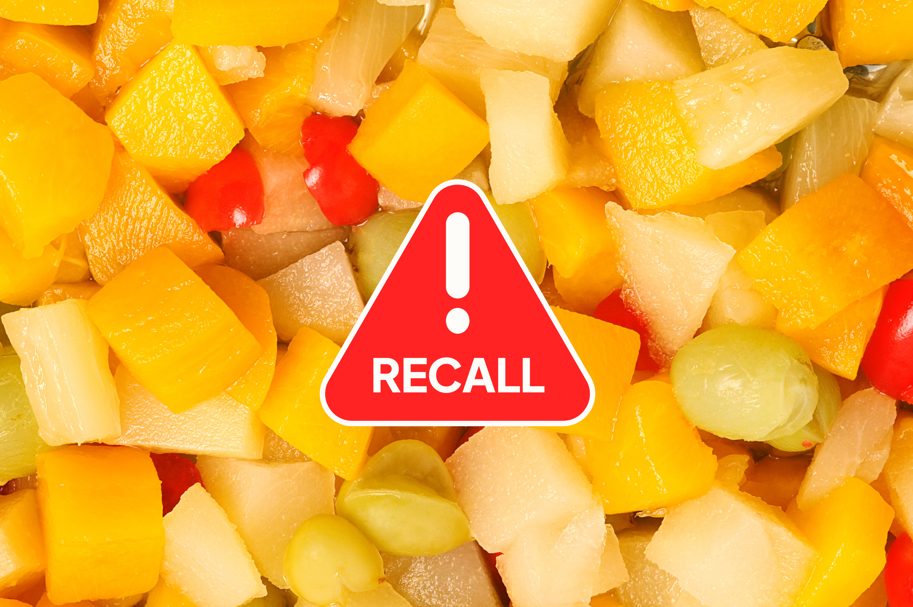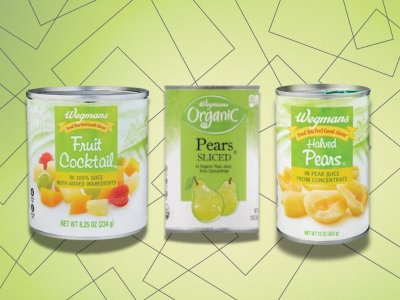
Pacific Coast Producers issued a voluntary recall for select lots of four fruit products on September 4 due to potential lead contamination. The California-based company's recall initially flew under the radar, but the FDA later issued a Class II risk classification for the recall on October 10, the second-highest level of concern in the agency's warning system.
The timing couldn't be more significant. Hospitalizations and deaths from contaminated food doubled in 2024 compared to previous years, making this recall part of a broader food safety crisis that's affecting American families nationwide.
What products are affected
The recall covers four specific canned fruit products that may have ended up in pantries across more than half the country. Here's what to look for:
Recalled products to check immediately
Fruit Cocktail in 100% Juice - 609 cases
Lot: 6FCB 02 C2206 | UPC: 077890461525 | Best by: Sept 1, 2027
Halved Pears in Pear Juice (Wegmans) - 102 cases
Lot: 6PJ 09 C2295 | UPC: 077890747490 | Best by: Sept 1, 2027
Halved Pears in Pear Juice (Walmart) - 1,836 cases
Lot: 6PJ 09 C2425 | UPC: 077890365410 | Best by: Sept 1, 2027
Sliced Pears in Organic Pear Juice - 203 cases
Lot: 6OPSJ 04 C2893 | UPC: 077890365410 | Best by: Sept 1, 2027
Products were distributed by Wegmans Food Markets and Walmart across Alabama, Arkansas, Arizona, California, Florida, Georgia, Illinois, Indiana, Kentucky, Louisiana, Maine, Missouri, Mississippi, Nebraska, New Mexico, Nevada, New York, Ohio, Oklahoma, Pennsylvania, South Carolina, Texas, Utah, Vermont, Washington, Wisconsin, and Wyoming.

Why this recall matters for your health
Class II risk classification refers to a situation where “use of or exposure to a violative product may cause temporary or medically reversible adverse health consequences or where the probability of serious adverse health consequences is remote,” according to the FDA. While that might sound reassuring, the reality about lead exposure tells a different story.
"There is no safe level of lead consumption"
Also read: Check your pantry: Popular canned fruit recalled over heavy metal contamination
Lead is toxic to humans and can affect people of any age or health status. For older adults, the health implications can be particularly concerning. Chronic lead exposure in adults is associated with kidney dysfunction, hypertension, and neurocognitive effects—issues that can compound existing health challenges many seniors already face.
The good news? No reports of illnesses have been reported by the FDA in connection with the consumption of the affected products. This suggests the recall was issued as a precautionary measure after contamination was detected during routine testing.
Did you know?
Pacific Coast Producers, the company behind this recall, has been operating since 1971 as a farmer-owned cooperative. They serve over 45,000 grocery stores nationwide and employ 4,000 people across production facilities in California, Oregon, and Washington—making the scope of this recall particularly significant.
What you should do right now
Don't panic, but do take action. Here's your step-by-step approach to handling this recall:
1. Check your pantry immediately. Look for any canned fruit products with the specific lot numbers and UPC codes listed above. The key identifiers are those long alphanumeric codes—they're usually printed on the bottom or side of the can.
2. If you find any of the recalled products, don't consume them under any circumstances. The FDA recommends either returning them to your place of purchase for a full refund or safely disposing of them. Many stores will accept returns even without a receipt for recalled items.
3. Take photos of the product labels before disposing of them. This creates a record that might be helpful if you need to consult with your healthcare provider about potential exposure, especially if you've already consumed some of the product.
Also read: Chocolate lovers, beware: Recall issued in 8 states over allergy risk
Staying safer in an uncertain food landscape
While this specific recall involves canned fruits, it's worth considering broader food safety practices. When shopping, pay attention to recall notices posted in stores and consider signing up for FDA recall alerts if you haven't already.
For canned goods specifically, inspect cans before purchasing. Avoid any that are dented, bulging, or show signs of rust, as these can indicate potential contamination issues beyond just lead exposure.
Consider diversifying your fruit intake between canned, fresh, and frozen options. This reduces your reliance on any single processing method or facility, naturally lowering your risk exposure.
Essential steps to protect yourself
- Check your pantry immediately for the specific recalled products listed
- Look for lot numbers 6FCB 02 C2206, 6PJ 09 C2295, 6PJ 09 C2425, and 6OPSJ 04 C2893
- Don't consume recalled products—return or dispose of them safely
- Take photos of product labels before disposal
- Sign up for FDA recall alerts to stay informed about future issues
- Diversify your fruit sources between canned, fresh, and frozen options
The recall remains ongoing, so continued vigilance is important. If you discover you've consumed any of the recalled products, don't assume the worst, but do monitor how you feel over the coming days. Lead poisoning symptoms can be subtle and develop gradually, so any persistent, unusual symptoms warrant a conversation with your healthcare provider.
Read next:
- The superbug threat hits close to home: Why American seniors are in the crosshairs
- Check your freezer: Recalled pasta linked to fatal listeria outbreak
- Highest risk warning issued as mushroom recall expands nationwide
What's your experience been with checking your pantry for recalled items? Have you found any of these specific products in your home, or do you have questions about food safety practices? Share your thoughts in the comments below—your experience might help fellow readers stay safer and more informed.






